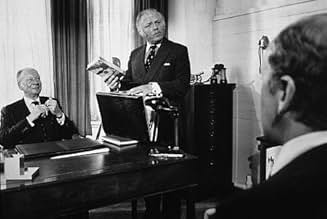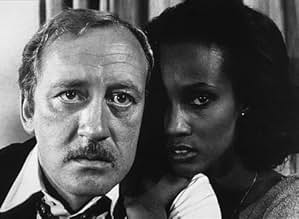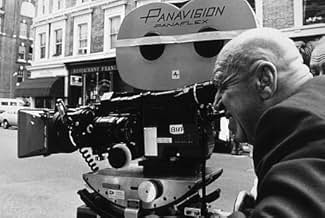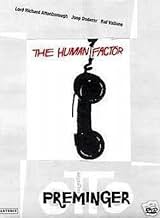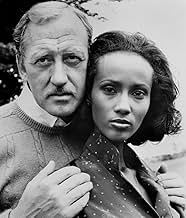IMDb RATING
6.1/10
1.7K
YOUR RATING
When a leak of information in the African section of British Intelligence is discovered, security man Daintry is brought in to investigate.When a leak of information in the African section of British Intelligence is discovered, security man Daintry is brought in to investigate.When a leak of information in the African section of British Intelligence is discovered, security man Daintry is brought in to investigate.
- Director
- Writers
- Stars
- Director
- Writers
- All cast & crew
- Production, box office & more at IMDbPro
Featured reviews
This is an odd film. 'Low-key' is certainly an apt description, and though I don't agree, I can see why some have dismissed it as flat, tedious, etc.
It has stayed in my mind after each viewing - I've seen it twice now on television - more than many other more critically praised films. There's something about the deliberate underplaying, the bland, familiar suburbia of the leading character's house, the politeness, the dog.... The film shows us a non-dramatic world in which dramatic events are being played out in secret, under cover of banal normality. It recalls the hurried departures of Kim Philby and friends from their own domestic lives. It's unsettling: what else might be happening in our own quiet streets?
Personally, I think it's rather wonderful. Clearly it's an ancestor of the brilliant TV adaptations of Le Carre; indeed, it feels more like Le Carre than Greene, which may be why Greene reportedly didn't like it. But it needs to be viewed for what it is: an essay in tension, told in a deliberately chosen style. If you only like action films, it's not for you.
It has stayed in my mind after each viewing - I've seen it twice now on television - more than many other more critically praised films. There's something about the deliberate underplaying, the bland, familiar suburbia of the leading character's house, the politeness, the dog.... The film shows us a non-dramatic world in which dramatic events are being played out in secret, under cover of banal normality. It recalls the hurried departures of Kim Philby and friends from their own domestic lives. It's unsettling: what else might be happening in our own quiet streets?
Personally, I think it's rather wonderful. Clearly it's an ancestor of the brilliant TV adaptations of Le Carre; indeed, it feels more like Le Carre than Greene, which may be why Greene reportedly didn't like it. But it needs to be viewed for what it is: an essay in tension, told in a deliberately chosen style. If you only like action films, it's not for you.
A Cold War Tragedy
Great dialogue and characters. Nicol Williamson plays our hero. He does some brilliant and subtle work here. Always a pleasure to see him on the screen.
Iman plays his wife. Unfortunately, she is hopelessly outclassed by the rest of the cast which makes her okay performance look worse by comparison.
Robert Morley steals the show as the villainous doctor who gets more of a thrill from killing than healing people. He owns every scene he is in.
As for the plot and pacing, I have some criticism. Just as the main story start to pick up steam, there is an extended flashback in the middle of the film that derails the momentum. I wish they found a different way to present that information that didn't effect the pacing.
Great dialogue and characters. Nicol Williamson plays our hero. He does some brilliant and subtle work here. Always a pleasure to see him on the screen.
Iman plays his wife. Unfortunately, she is hopelessly outclassed by the rest of the cast which makes her okay performance look worse by comparison.
Robert Morley steals the show as the villainous doctor who gets more of a thrill from killing than healing people. He owns every scene he is in.
As for the plot and pacing, I have some criticism. Just as the main story start to pick up steam, there is an extended flashback in the middle of the film that derails the momentum. I wish they found a different way to present that information that didn't effect the pacing.
I must confess that this was the first Otto Preminger movie I've seen, so I cannot comment it as an Otto Preminger movie, but rather just a movie among others.
I'm very much a fan of both cold war spy movies and 70/80s Great Britain, so the elements were in place for me to enjoy this. I had never heard of this (I'm yet to go through Preminger's movies) and I quite randomly picked it from the online service as it seemed pretty interesting.
And it was interesting. Very subtle and talkative, I have to say I really really liked it. The story itself wasn't too exciting, but interesting nonetheless. It's about the secret service and an apparent leak of information - possibility of double agents and so on. Very gripping, yet quite slow paced - no action. I just watched le Carre film "The Spy Who Came in from the Cold" and they are quite alike in style, altho I have to say I enjoyed this more. Even if it's not necessarily as well made, this wasn't quite as heavy-handed.
The acting is great for the most part. Nicol Williamson was a name I hadn't heard of before, but his presence really made this movie. Very understated and brilliant character, just like anyones neighbor or work colleague. There's a weak link too unfortunately and that's Iman, she's horribly wooden and unnatural in her acting most of the time.
I'm dropping one point because of sloppy cinematography too - lighting in particular and a few shots that look really staged. I'm not sure why some scenes were so horribly set up, the lights almost looked as if they just flipped a few spotlights over and pointed them at actors faces.
Despite these few flaws, it's a really enjoyable spy movie for anyone into cold war spy stories in style of le Carre etc. Grab a whisky and time machine yourself back into cold war era. This doesn't seem to be too well distributed tho so it may be a bit hard to find.
I'm very much a fan of both cold war spy movies and 70/80s Great Britain, so the elements were in place for me to enjoy this. I had never heard of this (I'm yet to go through Preminger's movies) and I quite randomly picked it from the online service as it seemed pretty interesting.
And it was interesting. Very subtle and talkative, I have to say I really really liked it. The story itself wasn't too exciting, but interesting nonetheless. It's about the secret service and an apparent leak of information - possibility of double agents and so on. Very gripping, yet quite slow paced - no action. I just watched le Carre film "The Spy Who Came in from the Cold" and they are quite alike in style, altho I have to say I enjoyed this more. Even if it's not necessarily as well made, this wasn't quite as heavy-handed.
The acting is great for the most part. Nicol Williamson was a name I hadn't heard of before, but his presence really made this movie. Very understated and brilliant character, just like anyones neighbor or work colleague. There's a weak link too unfortunately and that's Iman, she's horribly wooden and unnatural in her acting most of the time.
I'm dropping one point because of sloppy cinematography too - lighting in particular and a few shots that look really staged. I'm not sure why some scenes were so horribly set up, the lights almost looked as if they just flipped a few spotlights over and pointed them at actors faces.
Despite these few flaws, it's a really enjoyable spy movie for anyone into cold war spy stories in style of le Carre etc. Grab a whisky and time machine yourself back into cold war era. This doesn't seem to be too well distributed tho so it may be a bit hard to find.
'Sr Moreno' dismisses the Preminger film adaptation of 'The human factor' very intemperately: The clincher of his argument - which consists largely in being rude to Iman (she was perfectly adequate in her role, and certainly believably a beauty whom a career diplomat might have risked his career for) - is Graham Greene's own declared dislike of Preminger's version.
While obviously his own direct collaboration with Carol Reed made 'The Third Man' into the definitive Greene adaptation for the screen, and a classic sans pareil, there is still no need to be unduly respectful of his impatience with this version of his 'The human factor.'
After all, Greene had a well-known falling-out with Mankiewicz during the filming of the 1959 version of 'The quiet American,' but no-one else thinks that was a bad movie!
Few filmed adaptations are entirely successful - probably without the original author's close collaboration they will inevitably be more-or-less diminished versions of the literary form. And while Grahame Greene was perfectly entitled, with the status of 'onelie true begetter' to be hyper-critical of any lesser recensions, that is not a sensible reason for the rest of us not to enjoy and appreciate what is a perfectly intelligent and involving film in its own right.
There are few enough thrillers around on the TV today which do not involve various forms of adolescent excitability and excess that I should have thought the BBC were perfectly justified in giving it an airing recently on their 'thoughtful' channel.
This is no 'The third man' to be sure - but then, what is? This remains a film with, clearly, much in it to admire.
Surely, if every film has to achieve the status of 'masterpiece' before it can be accepted at all - as 'Moreno' appears to believe - then would there not be a certain danger of an unbridgeable culture-gap developing between the extremes of 'art-house film' and 'teen-flick'? Fortunately, audiences - and film-makers - are still quite willing to 'give it a go,' even if the results are 'merely' intelligent, rather than the absolutely brilliant - and still quite rare - product of genius!
Really, I feel most strongly that 'Moreno''s strictures represent exactly the kind of intellectual snobbery which can only tend to alienate cinema audiences even further from any more sober and challenging films.
There really are enough points of worthwhile discussion raised by this film of 'The human factor' for it to be impossible to dismiss in a single paragraph of supercilious contempt: 'Terrible' does not amount to a review, but only to intemperate spleen, I'm afraid.
While obviously his own direct collaboration with Carol Reed made 'The Third Man' into the definitive Greene adaptation for the screen, and a classic sans pareil, there is still no need to be unduly respectful of his impatience with this version of his 'The human factor.'
After all, Greene had a well-known falling-out with Mankiewicz during the filming of the 1959 version of 'The quiet American,' but no-one else thinks that was a bad movie!
Few filmed adaptations are entirely successful - probably without the original author's close collaboration they will inevitably be more-or-less diminished versions of the literary form. And while Grahame Greene was perfectly entitled, with the status of 'onelie true begetter' to be hyper-critical of any lesser recensions, that is not a sensible reason for the rest of us not to enjoy and appreciate what is a perfectly intelligent and involving film in its own right.
There are few enough thrillers around on the TV today which do not involve various forms of adolescent excitability and excess that I should have thought the BBC were perfectly justified in giving it an airing recently on their 'thoughtful' channel.
This is no 'The third man' to be sure - but then, what is? This remains a film with, clearly, much in it to admire.
Surely, if every film has to achieve the status of 'masterpiece' before it can be accepted at all - as 'Moreno' appears to believe - then would there not be a certain danger of an unbridgeable culture-gap developing between the extremes of 'art-house film' and 'teen-flick'? Fortunately, audiences - and film-makers - are still quite willing to 'give it a go,' even if the results are 'merely' intelligent, rather than the absolutely brilliant - and still quite rare - product of genius!
Really, I feel most strongly that 'Moreno''s strictures represent exactly the kind of intellectual snobbery which can only tend to alienate cinema audiences even further from any more sober and challenging films.
There really are enough points of worthwhile discussion raised by this film of 'The human factor' for it to be impossible to dismiss in a single paragraph of supercilious contempt: 'Terrible' does not amount to a review, but only to intemperate spleen, I'm afraid.
Maurice Castle (Nicol Williamson) is a bland mid-level bureaucrat in British intelligence. The only notable fact about him is his African wife Sarah (Iman). His superiors suspect a leak in the firm and decide to quietly eliminate the mole to avoid any publicity. Castle's office mate Arthur Davis (Derek Jacobi) becomes the main target of investigation.
Otto Preminger directs this realistic espionage thriller from a Graham Greene novel with many veteran British actors. With such great pedigree, I expected a great classic but this is definitely second tier level. It does get better in the second half. The first half is a slow slough. Maurice's blandness works against the film during that first half. In fact, he's a side character in his own movie. The production value is limited. This looks more like a TV movie. Preminger is really struggling even considering the budget. The filming is not imaginative and very static. It's almost a throwback to the early black and white movies. The only salvation is the Graham Greene writing which has a sense of realism which is very intriguing. This is a little disappointing.
Otto Preminger directs this realistic espionage thriller from a Graham Greene novel with many veteran British actors. With such great pedigree, I expected a great classic but this is definitely second tier level. It does get better in the second half. The first half is a slow slough. Maurice's blandness works against the film during that first half. In fact, he's a side character in his own movie. The production value is limited. This looks more like a TV movie. Preminger is really struggling even considering the budget. The filming is not imaginative and very static. It's almost a throwback to the early black and white movies. The only salvation is the Graham Greene writing which has a sense of realism which is very intriguing. This is a little disappointing.
Did you know
- TriviaAuthor Graham Greene said of his novel "The Human Factor" in his 1980 autobiography "Ways of Escape" that it was "to write a novel of espionage free from the conventional violence, which has not, in spite of James Bond, been a feature of the British Secret Service. I wanted to present the Service unromantically as a way of life, men going daily to their offices to earn their pensions."
- GoofsIn the South African scenes (filmed in Kenya), the cars have Kenyan registration plates.
- Quotes
Maurice Castle: [referring to Davis] He calls all children "little bastards".
- How long is The Human Factor?Powered by Alexa
Details
Box office
- Budget
- $5,500,000 (estimated)
- Gross US & Canada
- $376,050
- Gross worldwide
- $376,050
Contribute to this page
Suggest an edit or add missing content


